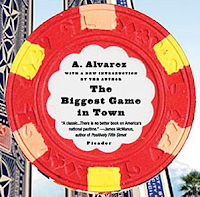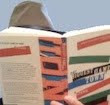Rereading The Biggest Game in Town: America, Where Gambling is a Form of Patriotism (6 of 6)
 Returning one final time to Chapter 3 of the The Biggest Game in Town by Al Alvarez...
Returning one final time to Chapter 3 of the The Biggest Game in Town by Al Alvarez...Just after that bit from Mickey Appleman about the “romance” of poker, the author elaborates further on the point and how he interprets it as a “romance of personal liberty” the life of a gambler can provide.
It is this sense of freedom from the “straight” world “that mesmerizes all the high rollers,” Alvarez insists. “They pride themselves on the fact that they survive spectacularly well outside the system.”
No bosses. Even the government has limited (or no) influence, given the way the money changing hands is rarely if ever reported as taxable income or expenses. In other words, complete independence -- or at least the belief one enjoys such -- with one’s success and/or failure directly consequent to one’s “own unaided talents.”
Alvarez concludes the chapter with an exchange he had with Jack Binion regarding this business of “personal liberty” and living “outside the system.” Binion tells Alvarez a story about an older gambler who -- like many of the high rollers -- had gone busto several times. Finally, at age 73, he hits a hot streak and finds himself up $700,000. Ignoring others’ advice, he saves none of it and ends up broke once more. The story could be said to symbolize various things, I suppose, but here it mainly functions as yet another example of personal freedom.
That’s when Binion brings up America. Where freedom rings and rings, dontcha know.
Speaking of the old fellow losing his roll yet again, Binion notes how “‘If you go broke here in America, you don’t really starve to death.’” His point isn’t really to refer to the various programs in place to aid the needy, but rather to argue that class differences in the U.S. aren’t as significant as they are in other countries. “‘Once you reach the lower middle class in United States,’” says Binion, “‘there’s no great difference between the top and bottom.’”
Alvarez isn’t so sure about this point of view, particularly when Binion insists that “‘if these guys [the high rollers] go broke they are going to have to play cheaper. That’s the only difference.’” Alvarez responds with incredulity at such nonchalance. “‘Cheaper?’” he says to Binion. “‘There are fortunes changing hands every day.’”
Alvarez notes how Binion shakes his head in apparent disappointment at his having failed to understand. Again we’re back to that disconnect between the “different ordering of reality” the high-stakes gamblers recognize and the world in which the rest of us live -- a world where the difference between $700,000 and $700 means a whole heckuva lot.
 Binion tries to explain the “free enterprise system” and how it allows each individual to spend his or her money however he or she wishes. Such a system also allows each person to assign value with freedom, too, e.g., to pay $100 for a bottle of wine. “‘To me that’s not worth it,’” says Binion, “‘but I’m not going to say it is foolish or wrong to spend that kind of money’” on a bottle of wine.
Binion tries to explain the “free enterprise system” and how it allows each individual to spend his or her money however he or she wishes. Such a system also allows each person to assign value with freedom, too, e.g., to pay $100 for a bottle of wine. “‘To me that’s not worth it,’” says Binion, “‘but I’m not going to say it is foolish or wrong to spend that kind of money’” on a bottle of wine.“‘That’s America,’” he adds, as if to provide a succinct explanation for what appears to be a highly complicated -- even paradoxical -- “system.” It’s all a bit of a head-scratcher for Alvarez -- “the uncomprehending foreigner,” as he imagines himself to appear to Binion.
America, land of the free. Where it is possible, if one desires, to exchange hundreds of thousands of dollars for small, round, clay chips, then utterly disregard all of the other goods for which that money might have been exchanged. Binion says “That’s America.” Alvarez adds “that, too, is Las Vegas -- the only place on earth where they justify gambling as a form of patriotism.”
These are passages I find most interesting to discuss with my “Poker in American Film and Culture” class. They seem to help support the course’s thesis, namely, that poker can serve as a “lens” through which to examine and learn about American culture. In a way that’s kind of what Alvarez is doing throughout his entire book -- looking at poker while learning about the U.S.
That said, I admit I feel a little like Alvarez here at the end of Chapter 3, finding the “lesson” Binion is trying teach to be less than obvious. Nevertheless, the exchange readily shows how poker provides a context for all sorts of so-called “American” ideas and values (freedom, liberty, independence, the “pursuit of happiness,” etc.). And Alvarez’s conclusion does somehow ring true. Somehow it makes sense to regard “gambling as a form of patriotism” in America -- a country founded, expanded, governed, and populated by gamblers throughout its history.
 Thanks for indulging me for this little sequence of posts. (Will return to the usual programming tomorrow.) If you haven’t read The Biggest Game in Town before, I do hope I’ve intrigued you to pick it up. Not only will you learn a lot about the history of poker, the WSOP, and the culture of Vegas circa early 1980s, but a lot else, too, about the U.S., questions of “reality,” and human nature, generally speaking.
Thanks for indulging me for this little sequence of posts. (Will return to the usual programming tomorrow.) If you haven’t read The Biggest Game in Town before, I do hope I’ve intrigued you to pick it up. Not only will you learn a lot about the history of poker, the WSOP, and the culture of Vegas circa early 1980s, but a lot else, too, about the U.S., questions of “reality,” and human nature, generally speaking.Labels: *by the book, Al Alvarez, Jack Binion, Poker in American Film and Culture, The Biggest Game in Town














2 Comments:
Great series of posts.
I've had the good fortune of getting to know some of the best in the game, and while all of them are different, I would use the words "savant" and "hyper competitive" to describe pretty much all of them.
If I had to pick one athlete that would be most similar to the prototypical "biggest game" players, it would definitely be Larry Bird, although Jordan fits better in some ways.
Thanks for the great "close reading".
This is cool, really an inspiration to continue and strive to be a best player soon.
Post a Comment
<< Home